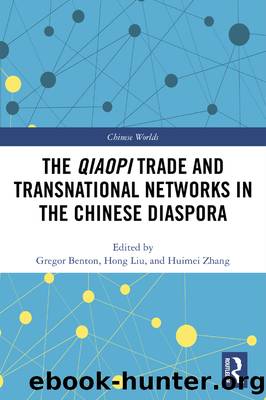The Qiaopi Trade and Transnational Networks in the Chinese Diaspora by Gregor Benton Hong Liu Huimei Zhang

Author:Gregor Benton, Hong Liu, Huimei Zhang [Gregor Benton, Hong Liu, Huimei Zhang]
Language: eng
Format: epub
Tags: Nonfiction, History, Asian, China, Social & Cultural Studies, Social Science, Cultural Studies, Ethnic Studies, Sociology
ISBN: 9781351623841
Publisher: Taylor and Francis
Published: 2018-05-03T04:00:00+00:00
4Serving the national interest
The qiaopi industry, the Chinese Post Office, and the transnational practices of the state, 1937â1945
Lane J. Harris
In the early twentieth century, the Chinese Post Office participated in a nation-building project to forge a territorially bound national community out of the disparate elements of the multi-ethnic Qing empire, but it also intervened in the transnational social spaces occupied by overseas Chinese during the War of Resistance against Japan (1937â1945). The first half of the twentieth century saw several migrant-sending states, like China and Italy, utilize discursive practices to secure the emigrantâs political loyalty and financial support in exchange for diplomatic protection in often hostile foreign environments (Choate 2007). The exigencies of war, however, provoked a more radical response by the Chinese state. With the Japanese threatening the flow of capital and remittances from abroad, the wartime Chinese state resourcefully pursued an agenda to disarticulate itself from its national territory, effectively deterritorializing itself, by constructing a state-run transnational network as a safe and reliable channel for the transmission of overseas Chinese remittances. It also encouraged overseas Chinese to support the wartime state financially by fostering a deterritorialized cultural identity of Chineseness that affirmed the global extent of the Chinese nation by naming immigrants and sojourners as national ethno-subjects or huaqiao guomin å侨å½æ° (overseas citizens), who had a vital, if largely economic, role to play in the anti-Japanese national salvation movement. If recognizing that the territorial state was not coterminous with the ethno-nation was easy, the wartime state still faced the challenges of circumventing international law by extending itself outside its borders, creating a transnational remittance network through cooperative agreements between state and private institutions, and convincing the overseas Chinese to use this network to transmit the remittances that would help financially sustain the war effort, all challenges made more difficult by the domination of the overseas Chinese remittance industry by the qiaopiju.
When the war began, the qiaopiju 侨æ¹å± had been dominating the flow of qiaohui ä¾¨æ± (overseas Chinese remittances) to the homeland for nearly a century. Qiaopiju, or overseas Chinese letter offices, were business firms that emerged in the mid-nineteenth century to specialize in transporting labour overseas, shipping goods throughout the diasporic network, handling private and business correspondence, and providing remittance and other banking services to overseas Chinese. In the mid-nineteenth century, they initially utilized geo-consanguineous ties as part of the organizational process of transnationalization, allowing them to make connections across land, border, and ocean. By the 1870s, the economic limitations inherent in relying exclusively on such ties coupled with the advent of new technologies and institutions allowed qiaopiju owners to create a more profitable business model. Rather than profit on remittance fees, qiaopiju owners took advantage of the accelerated time and economic incentives offered by telegraphs and steamships to use the remittances as short-term loans to engage in other economic activities â currency speculation, transshipping, securities trading, or arbitrage â in the time lag between accepting the remittances and the customerâs expectation of its delivery. To make their
Download
This site does not store any files on its server. We only index and link to content provided by other sites. Please contact the content providers to delete copyright contents if any and email us, we'll remove relevant links or contents immediately.
The Sympathizer by Viet Thanh Nguyen(4385)
The Rape of Nanking by Iris Chang(4204)
World without end by Ken Follett(3475)
Ants Among Elephants by Sujatha Gidla(3463)
Blood and Sand by Alex Von Tunzelmann(3196)
Japanese Design by Patricia J. Graham(3167)
The Queen of Nothing by Holly Black(2588)
City of Djinns: a year in Delhi by William Dalrymple(2555)
Foreign Devils on the Silk Road: The Search for the Lost Treasures of Central Asia by Peter Hopkirk(2463)
India's Ancient Past by R.S. Sharma(2451)
Inglorious Empire by Shashi Tharoor(2437)
Tokyo by Rob Goss(2427)
In Order to Live: A North Korean Girl's Journey to Freedom by Yeonmi Park(2387)
Tokyo Geek's Guide: Manga, Anime, Gaming, Cosplay, Toys, Idols & More - The Ultimate Guide to Japan's Otaku Culture by Simone Gianni(2370)
India's biggest cover-up by Dhar Anuj(2351)
The Great Game: On Secret Service in High Asia by Peter Hopkirk(2345)
Goodbye Madame Butterfly(2251)
Batik by Rudolf Smend(2179)
Living Silence in Burma by Christina Fink(2068)
